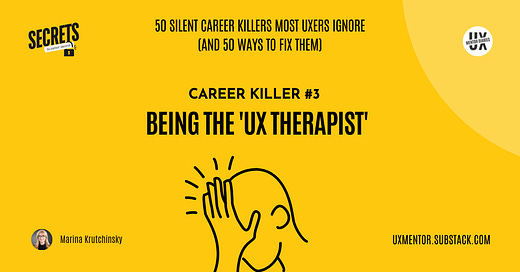🤫 The Silent Career Killer #3
Breaking Free from the "UX Therapist" Trap | Unmasking 50 hidden threats to your UX career | part 3 of 50
👋 Hi UX friend, Marina here!
Welcome to this week’s “Secrets to Career Success” 🔒 subscriber-only edition 🔒 of UX Mentor Diaries.
This newsletter series is my attempt to share what I've learned - often the hard way - about the silent career “sins” you may not even realize you’re committing and show easy ways to fix them to propel your career forward - as soon and as fast as possible.
If you’re not a paid subscriber, here’s what you missed:
Today, we're diving into a career pitfall that's as common as it is sneaky: the 'UX Therapist' syndrome. You know, that tendency to become the go-to person for venting about user issues without actually driving solutions. Sound familiar? Let's unpack this.
The Hidden Cost of Being Everyone's Favorite Listener
If you're constantly absorbing complaints without pushing for actionable solutions, you're not just spinning your wheels - you're actively sabotaging your UX career.
Here's why:
Credibility Erosion: Over time, you're seen as the "complaint department" rather than a problem-solver.
Missed Opportunities: While you're busy listening, others are busy implementing (even if imperfectly).
Emotional Burnout: Constantly absorbing negativity without resolution is a fast track to burnout.
Stagnant Progress: Problems remain unsolved, leading to a cycle of repeated complaints.
When is this a problem? Always, but especially...
During stakeholder interviews: When gathering insights should lead to action plans.
In user testing sessions: Where feedback needs to translate into design iterations.
During team meetings: Where problems are discussed but solutions are scarce.
In design critiques: When criticism doesn't evolve into constructive next steps.
And it's not just for the newbies...
Junior Designers: You risk being pigeonholed as a passive listener rather than an active problem-solver.
Mid-Levels & Seniors: Your ability to drive action directly impacts your leadership potential.
UX Leads: Your team looks to you to turn venting sessions into productive workshops.
UX Researchers: Your insights are only as valuable as the actions they inspire.
Does Meg’s story sound familiar?
Meg was a talented Senior UX Designer at a growing fintech startup.
She prided herself on her empathy and ability to really listen to users and stakeholders.
But...
Meg's calendar was packed with "coffee chats" where product managers and developers would vent about user frustrations.
She'd diligently note every complaint, feeling like she was really understanding the problems.
Months went by, and while Meg felt busy and in-demand, she realized that the same issues kept coming up in every meeting.
Her manager finally pulled her aside and said, "Meg, you're great at identifying problems, but we need someone who can drive solutions. We're considering bringing in a consultant to help move things forward."
Meg was shocked.
She thought she was doing her job by being a good listener.
In reality, she had become the team's emotional dumping ground, with nothing actionable to show for all her empathy.This scenario plays out in companies every day, stunting the careers of otherwise brilliant UXers.
But it doesn't have to be this way.
How to Transform from a “UX Therapist” to Solution Architect
So... how do you break free from the UX Therapist role without losing your empathetic edge?




